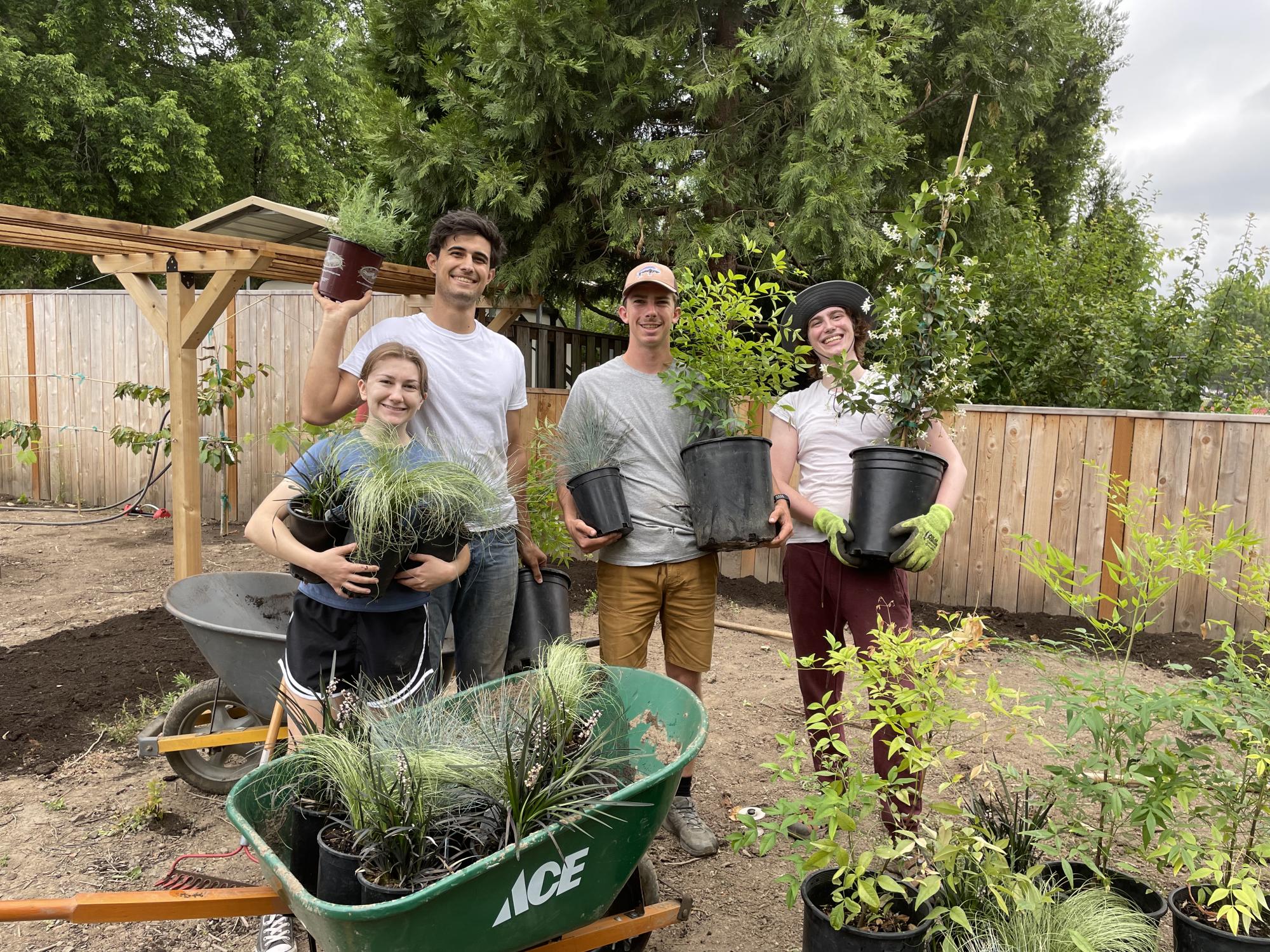B Street Project Moves to Boxer Gardens on Main Street
Pacific University has unveiled its new Boxer Gardens.
The gardens sit on a comp act .4-acre property on the Forest Grove Campus bordered on the west by Main Street, east by Hanson Stadium, north by the barber pole and south along the Stoller Center parking lot.
act .4-acre property on the Forest Grove Campus bordered on the west by Main Street, east by Hanson Stadium, north by the barber pole and south along the Stoller Center parking lot.
The opening of Boxer Gardens signals the end of the university’s relationship with the B Street Farm. Since 2005, Pacific has operated the B Street Sustainability Project on a three-acre Metro-owned property located about a mile away from the university.
“We deeply appreciate what B Street has meant to the community and Pacific University. Pacific decided to make the change to the Main Street Garden due to its proximity to campus and the smaller grounds,” said Sarah Phillips, College of Arts & Sciences dean.
“We are indebted to our students, alumni, faculty, the Forest Grove community, local schools and Metro for our partnership over the last 16 years, and Pacific will continue the lessons learned at B Street.”
The B Street Farm
Similar to B Street, but on a smaller scale, Boxer Gardens will continue the farm’s sustainability vision of a vibrant, thriving, and just community providing for its food, water, and energy needs through informed stewardship of the ecosystems within our bioregion. The gardens will also become the new outdoor lab for students in applied sustainability and environmental science studies programs.
Unlike B Street, Boxer Gardens will have an expanded purpose by opening the venue to outdoor gatherings for all.
“Of course, we want students learning in their outdoor classroom and interacting with the food systems and planning for future food systems,” said Kara Lanning, biology and environmental Science professor.
“We also want faculty and staff to enjoy the gardens, to invite performances and Homecoming events. Community events as well. It would be ideal to bring in community partners, new and established, to take advantage of this really dynamic beautiful space.”
For the last year, Lanning, Boxer Garden manager Ron Calkins, and students have been prepping Boxer Gardens, with a focus on the east side of the property. The garden was meticulously designed with the abilities of diverse visitors in mind. Some of the plants and flowers assist in sensory processing by emitting scents or producing sounds like a gentle wind chime. Wider pathways also allow for better mobility.

“This garden can produce a massive quantity of food and it encourages foraging so students can go out there and dig around and see what kind of food pops up. We've been able to harvest kale, turnips and daikon from this site and we're going to have squash and corn in the fall along with other edible plants.”
Boxer Gardens features an impressive economy of space. From Main Street, visitors are greeted by a garden shed, reminiscent of a barn, painted in Boxer red and trimmed in white. Nearby is a polyculture garden with a persimmon tree, fig trees, native berries, and a demonstration of row cropping. Over on the south side, there is a woodland garden filled with approximately 65% of plant species native to the Pacific Northwest. The east side features pathways along a pollinator strip with brightly colored flowers which feed pollinators and attract beneficial insects. They also help increase food crop yields. Moving north along the garden, reclaimed bricks mixed with new ones form a vibrant mosaic patio, inviting people to sit, reflect and relax.
Boxer Gardens is a labor of love funded in part by the generosity of the Juan Young Trust which donated $24,500 to establish the garden. The College of Arts & Sciences also paid for staff, faculty and student salaries over the summer plus another $6,000 for supplies.
For her next project, Lanning  has her sights set on getting Pacific University on Tualatin Valley’s Quilt Barn Trail. A quilt barn is a painting on a wooden block in a quilting pattern which decorates a barn. Designs are in the works for the artwork.
has her sights set on getting Pacific University on Tualatin Valley’s Quilt Barn Trail. A quilt barn is a painting on a wooden block in a quilting pattern which decorates a barn. Designs are in the works for the artwork.
“That would be our first art installation on the space. Every good garden has art,” Lanning beamed.
And that’s just the beginning. Her wish list includes a hoop house, adding a small stage for performances and lectures, and an outdoor cooking area with a pizza oven and grill.
There is also another building on the property which could be turned into a classroom, laboratory, housing for the sustainability program, or who knows. The possibilities, like the plants in the garden, are endless.


